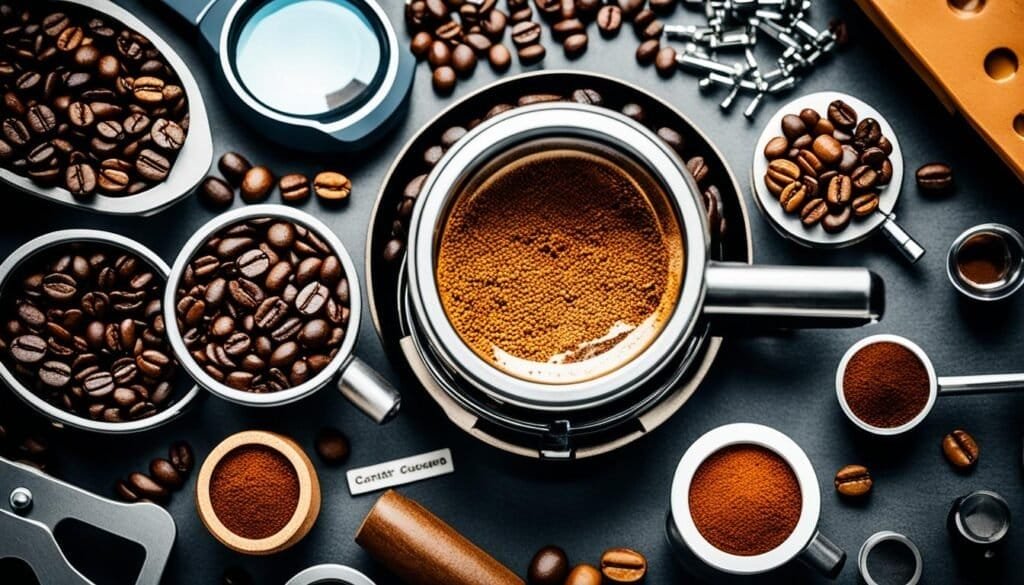Did you know that there are over 100 different coffee brewing methods worldwide? From classic drip brewing to innovative cold brew techniques, the world of coffee offers a vast array of flavors, aromas, and brewing possibilities to explore. If you’re passionate about coffee and want to expand your knowledge, there are numerous avenues you can embark on to enhance your understanding of specialty coffee origins, barista techniques, and the art of coffee tasting.
Whether you’re a coffee enthusiast, a barista looking to level up your skills, or a coffee shop owner aiming to elevate the quality of your offerings, this article will guide you through the best ways to advance your coffee knowledge. From immersive coffee culture exploration to online courses and industry trends, you’ll discover a wealth of resources and opportunities to develop your expertise.
- Explore coffee blogs, magazines, and podcasts for a wealth of knowledge and insights.
- Engage with baristas, attend cuppings, and tasting events to learn about different brewing methods.
- Consider taking classes, workshops, or online courses to deepen your understanding of barista skills.
- Immerse yourself in coffee culture by visiting specialty coffee shops and attending coffee festivals.
- Stay up to date with industry trends and advancements to continuously expand your coffee knowledge.
Understanding Basic Coffee Knowledge
Before diving deeper into the world of coffee, it’s important to have a solid understanding of the basics. Familiarize yourself with coffee flavor profiles, such as the balance between acidity, sweetness, and other descriptors. Understanding these profiles will help you appreciate and communicate the complex flavors found in different coffee varieties.
Next, learn about coffee production and processing methods. This knowledge will give you insights into how coffee beans are grown, harvested, and processed before they reach your cup. Explore the difference between single origin and blends, and how they can contribute to the flavors and nuances of your coffee.
Additionally, it’s important to consider the impact of roasting on coffee flavor. Different roast levels bring out distinct characteristics in the beans, from light and bright to dark and bold. Understanding these differences will help you select coffee that suits your taste preferences.
Extraction and brewing techniques play a crucial role in determining the final flavor of your coffee. Factors such as grind size, water temperature, and ratios can greatly influence the extraction process. Experiment with these variables to achieve the desired taste and balance in your cup.
By mastering these basic coffee knowledge, you’ll have a strong foundation for advancing your coffee expertise and exploring the world of specialty coffee.
Mastering Barista Techniques
To elevate your coffee knowledge, it’s essential to master various barista techniques. Start by honing your skills in grinding coffee, understanding the impact of grind size on extraction and adjusting settings accordingly. Next, focus on espresso making, including tamping, distribution, and learning about different brewing variables like pre-infusion and pressure profiling.
Develop expertise in milk steaming and pouring to create velvety textured milk for drinks like lattes and cappuccinos, and consider delving into manual and batch brewing techniques for pour-overs and drip coffee. Additionally, explore recipe creation for signature beverages and mocktails, combining flavors, textures, and presentation to create unique coffee experiences.
By mastering these barista techniques, you’ll be able to consistently produce high-quality coffee and cater to a variety of customer preferences.
Grinding Coffee
Grinding coffee is a crucial step in the coffee brewing process. The grind size directly affects the extraction rate and flavor profile of the coffee. Experiment with different grind settings on your grinder to find the optimal size for various brew methods such as espresso, pour-over, or French press. Remember to adjust the grind size based on factors like coffee freshness, desired extraction, and brewing time.
Espresso Making
Espresso making requires precision and attention to detail. Focus on techniques like tamping and distribution to ensure even extraction and a balanced espresso shot. Experiment with variables like grind size, water temperature, and shot volume to achieve the desired flavor profile. Learn about pre-infusion and pressure profiling to further refine your espresso-making skills and create a unique coffee experience for your customers.
Milk Steaming and Pouring
Mastering the art of milk steaming and pouring is essential for creating delicious and visually appealing milk-based beverages. Learn different steaming techniques to achieve the desired texture, temperature, and microfoam consistency. Practice pouring techniques to create latte art designs and enhance the overall aesthetic appeal of your drinks.
Manual and Batch Brewing Techniques
While espresso is often the star of the show, manual and batch brewing methods offer a different coffee experience. Dive into manual brewing techniques such as pour-over, Aeropress, or siphon brewing to highlight specific flavor notes and explore different brewing parameters. Additionally, explore the world of batch brewing with equipment like batch brewers or coffee machines for larger volumes of coffee.
Recipe Creation
Creating unique and enticing coffee recipes is an art form in itself. Experiment with flavor combinations, ingredient ratios, and presentation to develop signature beverages and mocktails that cater to your customers’ preferences. Consider incorporating seasonal flavors, alternative milks, and garnishes to elevate the sensory experience of your coffee creations.

Implementing a Coffee Quality Program
Enhancing the quality of your coffee shop’s offerings goes beyond just serving a good cup of coffee. It requires implementing a comprehensive coffee quality program that encompasses various aspects of your business. By focusing on defining quality standards, implementing an ongoing coffee knowledge program, embracing the Systems Strategist approach, and refining your menu, you can consistently deliver exceptional coffee experiences to your customers.
Defining Quality Standards
Start by clearly defining your coffee shop’s standards of quality. This can be based on cupping scores, flavor profiles, customer satisfaction, or a combination of factors. It’s important to have a clear understanding of what constitutes a high-quality cup of coffee in your shop, and communicate these standards to your staff.
Ongoing Coffee Knowledge Program
A successful coffee quality program includes an ongoing coffee knowledge program for your staff. This program should focus on continuous learning and improvement, giving your baristas the tools and knowledge they need to consistently deliver excellent coffee. Provide opportunities for your staff to attend workshops, training sessions, or online courses to expand their coffee knowledge and refine their skills.
Embracing the Systems Strategist Approach
The Systems Strategist approach involves analyzing and optimizing the various systems in your coffee shop to address recurring coffee quality problems. It’s important to identify any areas where improvements can be made, whether it’s in the equipment, workflow, or training processes. By taking a holistic approach and making necessary adjustments, you can ensure that every step of the coffee-making process is optimized for quality.
Menu Refinement
Another crucial aspect of a coffee quality program is refining your menu. Focus on what you do best and streamline your offerings to reduce complexity. This allows for better control over the coffee quality and ensures that every drink on your menu meets your defined standards of excellence. Regularly review and update your menu to reflect the latest industry trends and customer preferences.
| Benefits of Implementing a Coffee Quality Program | How it Enhances Your Coffee Shop |
|---|---|
| Consistency | Deliver a consistently high-quality cup of coffee that keeps customers coming back for more. |
| Customer Satisfaction | Meet and exceed customer expectations by consistently providing exceptional coffee experiences. |
| Competitive Advantage | Stand out from the competition by offering superior coffee quality and expertise. |
| Brand Reputation | Build a strong brand reputation as a coffee shop that prioritizes quality and customer satisfaction. |
Implementing a coffee quality program is an investment in the long-term success of your coffee shop. By defining quality standards, fostering ongoing coffee knowledge, utilizing the Systems Strategist approach, and refining your menu, you can ensure that every cup of coffee you serve meets the highest standards of excellence.

Conclusion
In conclusion, advancing your coffee knowledge and improving coffee quality is a continuous journey that requires dedication and a commitment to learning. By following the best ways to enhance your coffee knowledge, such as exploring coffee blogs, magazines, podcasts, and attending tastings, classes, and coffee tours, you’ll expand your understanding of specialty coffee and stay up to date with industry trends.
Additionally, mastering barista techniques, implementing a coffee quality program, and refining your menu will contribute to the overall improvement of coffee quality at your coffee shop. By honing your skills in grinding coffee, espresso making, milk steaming and pouring, as well as manual and batch brewing, you’ll be able to consistently produce high-quality coffee that delights your customers.
It’s important to remember that coffee knowledge is constantly evolving, so staying informed about advancements in the industry is crucial. Continuously seek opportunities to enhance your coffee education, whether through online courses, workshops, or industry events. By staying committed to coffee knowledge enhancement and coffee quality improvement, you’ll be well-equipped to provide exceptional coffee experiences that set you apart from the competition.
FAQ
What are the best ways to advance my coffee knowledge?
There are several ways to expand your coffee knowledge, including reading coffee blogs and magazines, listening to coffee podcasts, visiting specialty coffee shops, attending cuppings or tastings, taking classes or online courses, and exploring coffee culture through travel and festivals.
What should I know about basic coffee knowledge?
Familiarize yourself with coffee flavor profiles, coffee production and processing methods, the impact of roast levels on flavor, and the process of extraction. Understanding these basics will provide a strong foundation for advancing your coffee expertise.
How can I master barista techniques?
Start by honing your skills in grinding coffee and understanding the impact of grind size on extraction. Then focus on espresso making, milk steaming and pouring, and manual and batch brewing techniques. Additionally, explore recipe creation for signature beverages and mocktails.
How can I implement a coffee quality program?
Start by defining your standards of quality and developing an ongoing coffee knowledge program for your staff. Embrace the Systems Strategist approach to analyze and optimize coffee quality systems in your shop. Refine your menu to reduce complexity and focus on what you do best.
Any conclusions about advancing coffee knowledge and improving quality?
Advancing coffee knowledge and improving coffee quality is a continuous journey that requires dedication and a commitment to learning. By following the best ways to advance your coffee knowledge, mastering barista techniques, implementing a coffee quality program, and staying up to date with industry trends, you’ll be able to provide exceptional coffee experiences.




